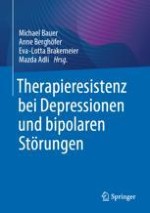2022 | OriginalPaper | Buchkapitel
7. Einsatz von Antipsychotika, Antikonvulsiva, Stimulantien, Benzodiazepinen und Hypnotika bei therapieresistenten Depressionen
verfasst von : Stephan Köhler, Cora Schefft
Erschienen in: Therapieresistenz bei Depressionen und bipolaren Störungen
Verlag: Springer Berlin Heidelberg











